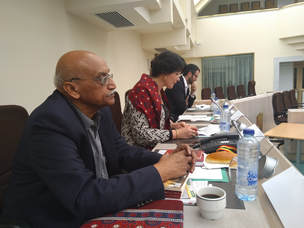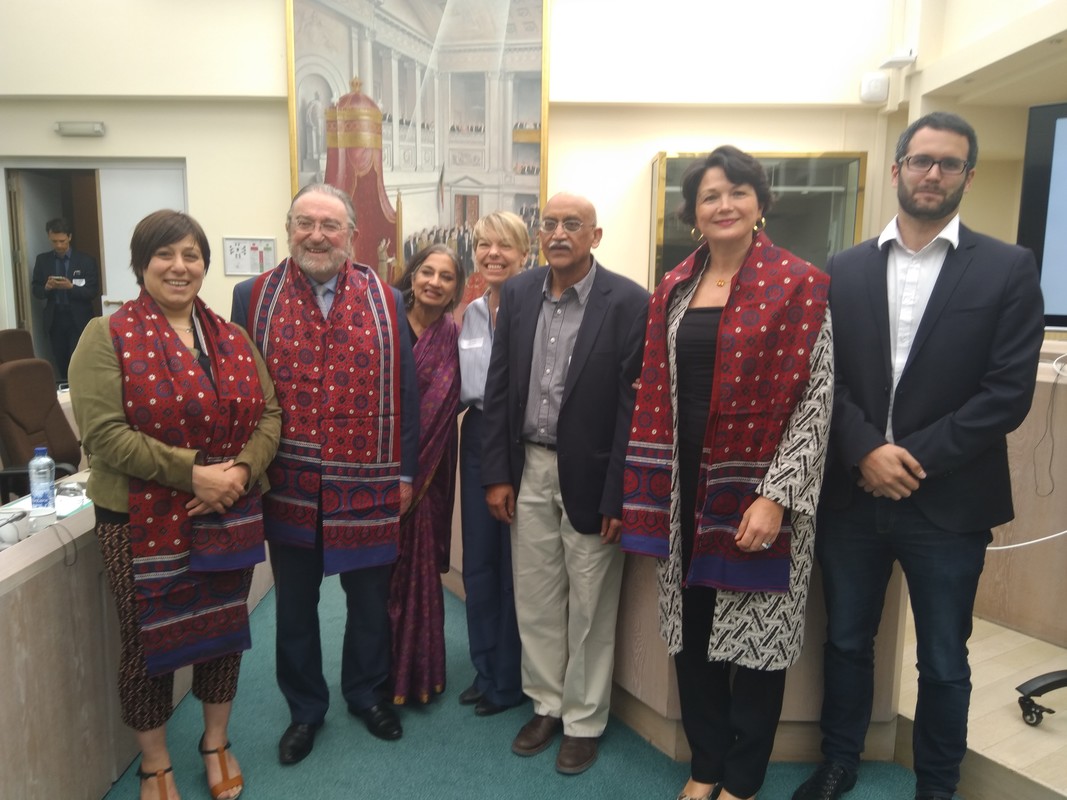 Left to right: Dr. Shershah Syed, Sabien Lahaye-Battheu, Felipe Sere. Copyright: Sensoa
Left to right: Dr. Shershah Syed, Sabien Lahaye-Battheu, Felipe Sere. Copyright: Sensoa Despite progress in safe deliveries, 830 women die every day due to pregnancy and delivery related complications and millions of women live with long lasting health problems as a result of them. Fistulas are one of the most serious delivery complications. Fistulas can lead to still births, incontinence, stigma, shame and social exclusion and in some cases the mother’s death. Approximately 2 million women live with the complication. Reasons enough to put the problem in the spotlight.
In the run up to Mothers’ Day, the Parliamentarians for the 2030 Agenda hosted a seminar on the problem of unsafe deliveries and fistula in the South. Dr. Shershah Syed, fistula surgeon from Pakistan and founder of the Koothi Goth Women’s Hospital in Karachi was a guest at the federal parliament and spoke of his many years’ experience in the fight against fistula. “Fistula are the poor people’s problem. Women who are well off deliver in private hospitals. But those who have no means deliver at home with the aid of traditional birth attendants. Some lack the competency to ensure a safe delivery.”
Stigma makes women vulnerable
Finding women who live with a fistula is a challenge, given the stigma is so big. “When women get fistula they often become incontinent. They leak urine and are considered impure. A fistula is seen as a punishment of God, which is why women are often hidden from the outside world. This makes it very difficult to find women with the complication to treat them.” The doctor has experience setting up camps in the countryside. Women are called into the field hospital for treatment. Once they have recovered, they return to their villages and spread the word.
Early marriages as one of the causes
Unsafe deliveries and fistulas are strongly related to teenage pregnancies, because girls get married at an early age. A majority of women in Pakistan marries before the age of 18. “Recently one province took the initiative to forbid early marriages, but that decision requires the approval of the Senate and that is where the difficulty lies. The Senate will consult the Islamic Council of religious leaders and they will reject the proposal”, the Doctor explained. “According to the religious leaders a girl turns into a woman when she menstruates the first time and thus will be expected to marry as soon as possible.
Government does not promote family planning
Family planning, the best way to prevent unplanned and recurrent pregnancies, is not allowed by many religious leaders. They are influential and many people follow their advice. “Several NGOs are actively campaigning for family planning, but this is the government’s responsibility”, Dr. Shershah argued. Pressure from outside can make a difference though, as the government is concerned about its international image.
Delivery at home, after all?
Wendy Marijnissen, photographer who followed Dr. Shershah’s work in Karachi closely, witnessed the problem of unsafe deliveries first hand. There’s a stark contrast between home deliveries and those in public hospitals. One’s income determines the quality of care. People who have very little end up in overcrowded rooms lacking any kind of privacy. Home deliveries by contrast are more quiet and intimate, and both the mother and mother in law are actively involved in the deliveries of their daughters. This explains why some women still prefer home deliveries.
‘Fistulas are an indication that health systems are not within reach of those who need them'
Fistulas are a problem of the poor as they lack access to decent health systems, Felipe Sere, public health expert for Memisa underlined. Particularly in Sub-Saharan Africa, fistulas and unsafe deliveries are a big problem: “New cases of fistulas are an indication that the health systems are not within reach of those who need them”.
Even though a cesarean or C-section can prevent fistula, the real answer lies in a holistic approach. “The promotion of C-sections makes little sense if there is no staff to conduct the operation. Or if there is simply no way to get to the hospital.” Girls’ education, but also the fight against malnutrition, helps to prevent this kind of complication. It prevents girls from marrying too young and getting pregnant too early and helps them to have a health body, which limits the chances of complications. Apart from that, health financing is imperative. Collective health insurance can help to keep the delivery costs affordable.
Belgium can still do better
Is the Belgian government putting enough effort into safe deliveries and fistula prevention? The answer is twofold, according to Sere. With ‘She Decides’, sexual and reproductive health and rights are a priority for the Belgian Development Cooperation. But the problem of unsafe deliveries and fistulas remains really big and more means are required to tackle it. In this sense, Belgium should really engage to spend 0.7% of its wealth on development cooperation. A holistic approach requires investments in health systems and primary health care, with special attention for safe deliveries.
Stigma makes women vulnerable
Finding women who live with a fistula is a challenge, given the stigma is so big. “When women get fistula they often become incontinent. They leak urine and are considered impure. A fistula is seen as a punishment of God, which is why women are often hidden from the outside world. This makes it very difficult to find women with the complication to treat them.” The doctor has experience setting up camps in the countryside. Women are called into the field hospital for treatment. Once they have recovered, they return to their villages and spread the word.
Early marriages as one of the causes
Unsafe deliveries and fistulas are strongly related to teenage pregnancies, because girls get married at an early age. A majority of women in Pakistan marries before the age of 18. “Recently one province took the initiative to forbid early marriages, but that decision requires the approval of the Senate and that is where the difficulty lies. The Senate will consult the Islamic Council of religious leaders and they will reject the proposal”, the Doctor explained. “According to the religious leaders a girl turns into a woman when she menstruates the first time and thus will be expected to marry as soon as possible.
Government does not promote family planning
Family planning, the best way to prevent unplanned and recurrent pregnancies, is not allowed by many religious leaders. They are influential and many people follow their advice. “Several NGOs are actively campaigning for family planning, but this is the government’s responsibility”, Dr. Shershah argued. Pressure from outside can make a difference though, as the government is concerned about its international image.
Delivery at home, after all?
Wendy Marijnissen, photographer who followed Dr. Shershah’s work in Karachi closely, witnessed the problem of unsafe deliveries first hand. There’s a stark contrast between home deliveries and those in public hospitals. One’s income determines the quality of care. People who have very little end up in overcrowded rooms lacking any kind of privacy. Home deliveries by contrast are more quiet and intimate, and both the mother and mother in law are actively involved in the deliveries of their daughters. This explains why some women still prefer home deliveries.
‘Fistulas are an indication that health systems are not within reach of those who need them'
Fistulas are a problem of the poor as they lack access to decent health systems, Felipe Sere, public health expert for Memisa underlined. Particularly in Sub-Saharan Africa, fistulas and unsafe deliveries are a big problem: “New cases of fistulas are an indication that the health systems are not within reach of those who need them”.
Even though a cesarean or C-section can prevent fistula, the real answer lies in a holistic approach. “The promotion of C-sections makes little sense if there is no staff to conduct the operation. Or if there is simply no way to get to the hospital.” Girls’ education, but also the fight against malnutrition, helps to prevent this kind of complication. It prevents girls from marrying too young and getting pregnant too early and helps them to have a health body, which limits the chances of complications. Apart from that, health financing is imperative. Collective health insurance can help to keep the delivery costs affordable.
Belgium can still do better
Is the Belgian government putting enough effort into safe deliveries and fistula prevention? The answer is twofold, according to Sere. With ‘She Decides’, sexual and reproductive health and rights are a priority for the Belgian Development Cooperation. But the problem of unsafe deliveries and fistulas remains really big and more means are required to tackle it. In this sense, Belgium should really engage to spend 0.7% of its wealth on development cooperation. A holistic approach requires investments in health systems and primary health care, with special attention for safe deliveries.


 RSS Feed
RSS Feed